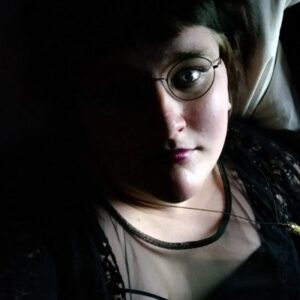A Point of Pride: Interview with Gretchen Felker-Martin

Gretchen Felker-Martin is Massachusetts-based horror writer and film critic. Her debut novel, Manhunt, is out now from Tor Nightfire. You can follow her work @scumbelievable on Twitter.

What inspired you to start writing?
I don’t think it was any one thing. Bob Flanagan, the famous masochist and performance artist, had a wonderful spoken-word poem about the roots of his masochism, and he lists just hundreds and hundreds of factors, and it’s like that for me. The woods of rural New Hampshire, Monica Furlong, James Gurney’s Dinotopia, my childhood asthma, watching Clive Barker movies and Alien too young, being bullied for being fat and queer, Isaac Asimov, Stephen King, my nightmares, my queerness, having sex way too young, naked vampire Monica Bellucci coming out of the bed in Bram Stoker’s Dracula, dinosaurs, the ocean, being abused, hating math.
What was it about the horror genre that drew you to it?
I’m a sadomasochist, I’m kinky, and my body is deviant to the rest of the world because I’m fat and trans, so I’ve always loved controlled pain and discomfort, and when you’re reading horror you’re inflicting something on yourself and you get this chance to learn what disgusts you, what frightens you, and why. I was a glutton for punishment from a very young age. I used to ask my father to reread scenes from bedtime stories that gave me nightmares.
Do you make a conscious effort to include LGBTQ material in your writing, and if so, what do you want to portray?
My whole world is queer people, so I wouldn’t call it a conscious effort, but when I’m writing it’s for queers, always, and what I want to do is reach out to them and show them all these things they’ve been taught to feel about themselves and let them know other people are feeling it too, and having the same unspeakable thoughts, and being just as fucked up and sad and dumb and horny as they are. I want us to feel like human beings.
What has writing horror taught you about the world and yourself?
That feeling disgust or fear is often morally meaningless. We recoil from things because it’s been advantageous throughout our existence to avoid rotten food, to avoid spreading disease by commingling disparate populations, but that’s lizard-brain stuff; it doesn’t mean anything about who deserves rights and who doesn’t. We let this kind of disgust and reflexive rage run huge parts of the world. We’re seeing it run the West right now regarding trans people, the homeless, Black people—writing horror has taught me not to take my own fears or anxieties too seriously.
How have you seen the horror genre change over the years? And how do you think it will continue to evolve?
I love where horror is headed right now. In film, we’re in a new golden age, at least one stone-cold classic every year, good B movies dropping regularly, and in books, you’re seeing people like Paula Ashe and Briar Ripley Page and Hailey Piper and Eric LaRocca bringing this angry, florid queerness into their work, totally unapologetically, and it’s so raw, it’s so vile. I love it. I think as things deteriorate, and my generation and Gen Z continue to age in a world intent on grinding us into living death via capitalism and fascism, it’ll only get more extreme, more a protracted scream of denial and resistance and outrage. Good.
How do you feel the LGBTQ community has been represented thus far in the genre, and what hopes do you have for representation in the genre going forward?
We’ve always been at the heart of horror. Stoker was queer, le Fanu, both Shelleys, Jackson, Barker, Byron, Brite—and sure a lot of us were closeted, self-loathing, what have you, but I consider that representation more important than the things people call for more vocally: happy endings, queer palatability and respectability, queer characters who “set a good example”. Read a board book if you want to know how to be nice. I want more gross, messy, evil, idiotic queer characters. I want to see my own experience of suffering and extremity on the page. It’s not that there can’t be other things, that other people can’t want nicer or milder queers in their fiction, it’s just that it doesn’t interest me.
Who are some of your favorite LGBTQ characters in horror?
Theo from The Haunting of Hill House, Merricat from We Have Always Lived in the Castle, Adrian Mellon from the harrowing prologue of Stephen King’s IT, River from Briar Ripley Page’s Corrupted Vessels, the entire cast of Cronenberg’s Crash but especially Vaughan and Dr. Helen Remington, the doctors Beverly and Elliot Mantle from the new adaptation of Cronenberg’s Dead Ringers by Alice Birch.
Who are some LGBTQ horror authors you recommend our audience check out?
Melanie Tem, Shirley Jackson, Porpentine, Hailey Piper, Eve Harms, Eric LaRocca, Joe Koch, Meg Elison, Briar Ripley Page, Lee Mandelo, Naben Ruthnum, Cassandra Khaw, Samuel R. Delany, Clive Barker. I don’t know whether or not B. R. Yeager is queer, but he writes queers wonderfully.
What is one piece of advice you would give horror authors today?
Go harder, be meaner.
And to the LGBTQ writers out there who are just getting started, what advice would you give them?
Don’t give even a second of your time to anyone who calls your work degenerate or offensive or morally corrupt—they’ve been doing it since before the Nazis, and it’s never mattered one damn whit. Write exactly what you want, be exactly who you are, because they’ll clutch their pearls about it even if you try to soft-pedal your ideas.



